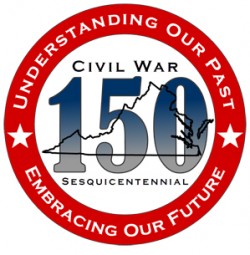 Last night I took part in a community forum on the Civil War Sesquicentennial with Waite Rawls, III, Executive Director of the Museum of the Confederacy and Christy Coleman, President of the American Civil War Center at Historic Tredegar. The event took place in Alberta at the Southside Virginia Community College and was organized by Brunswick County Civil War Sesquicentennial Committee. For about 1 hour, and in front of a racially-mixed audience numbering around 100, we discussed the reasons for and importance of commemorating the sesquicentennial. It was a lively discussion and it was truly an honor to be asked to join this roundtable. I have nothing but the highest admiration for the work that Christy and Waite do at their respective institutions on a daily basis. The challenges they face are numerous, but they proceed with the full understanding that their work matters. I could listen to Christy talk about public history all night long.
Last night I took part in a community forum on the Civil War Sesquicentennial with Waite Rawls, III, Executive Director of the Museum of the Confederacy and Christy Coleman, President of the American Civil War Center at Historic Tredegar. The event took place in Alberta at the Southside Virginia Community College and was organized by Brunswick County Civil War Sesquicentennial Committee. For about 1 hour, and in front of a racially-mixed audience numbering around 100, we discussed the reasons for and importance of commemorating the sesquicentennial. It was a lively discussion and it was truly an honor to be asked to join this roundtable. I have nothing but the highest admiration for the work that Christy and Waite do at their respective institutions on a daily basis. The challenges they face are numerous, but they proceed with the full understanding that their work matters. I could listen to Christy talk about public history all night long.
Each of us had an opportunity to make an opening statement, which I used to discuss my work in the classroom and how I’ve tried to integrate the sesquicentennial into some of my lessons. I talked about readings, class discussions, and my annual trip to Monument Avenue and Hollywood Cemetery in Richmond. The audience was given plenty of time to ask questions and they did not disappoint. I was singled out early on in the discussion by a group, whose questions were entertaining if not predictable. One individual asked where I was born followed by some rather odd questions about my teaching style. My personal favorite was a question that asked if I teach my students that Robert E. Lee, Stonewall Jackson, and J.E.B. Stuart were great men. I usually don’t respond to the place of birth question, but I successfully diffused it by pointing out that I am from southern New Jersey. The question is, of course, silly since it implies some kind of privilege or unique access to the past depending on birth. As to the importance of Lee and the rest of the gang I simply noted that as a history teacher it is not my responsibility to tell them what to believe about any historic figure. My job is to provide my students with the analytical skills to draw their own conclusions. Some of these same people suspect that I am corrupting my students by teaching them to “hate the South” and yet they have no problem telling me how I should influence what my students believe about the Civil War.
After explaining what I do on my trips to class trips to Richmond I was asked if I only teach “controversial history.” In other words, do I ever just tell stories about the men enshrined in the various monuments. Once again, I tried to explain that my goal is not to force my students to assume any one perspective on the past. My Richmond trip [and here] is an attempt to teach students how to interpret statues and other other historic sites. The lesson is not about the subjects themselves, but about how a community/organization chooses to remember and commemorate. I don’t know if the individual in question understood this. I guess the shorter would be, yes, I teach “controversial history.”
Overall, I have to say that this event was a huge success and well worth the 2 hour drive. I want to thank the Brunswick County commission for organizing the event and to Bobby Conner, who invited me to participate. Last night’s event was a wonderful example of what can be done on a local level to commemorate Virginia’s past and encourage public dialog. Here is one local commission that is clearly on the right track.
Well heck, Kevin, if you ‘re from southern New Jersey, those folks don’t have anything to worry about. After all, the southern third of the state, as you know, is south of Mason-Dixon. Although a Southerner myself, I’ve developed a certain fondness for New Jersey since my daughter has spent the last four years at grad school up there.
By the way, I came across your web-site by accident. It is first-class and, as a retired American history teacher myself, I really enjoy the articles. Keep up the good work.
Thanks for the kind words.
The New Jersey Electoral College vote was 4 for Lincoln and 3 for Douglas. We always knew you were a closeted Secesh! 🙂
Kevin-You also could have pointed out that you were born in a state that, while it did not join the rebellion, was, nevertheless, still a slave state according to the 1860 census (OK: 18 slaves to be precise). IIRR, New Jersey was one of the last “Northern” states to pass a gradual emancipation law (so at least half of the slaves in the 1860 census were 40 years of age or older)
And, if I remember correctly, New Jersey split its electoral vote. Southern New Jersey voted for Douglas.